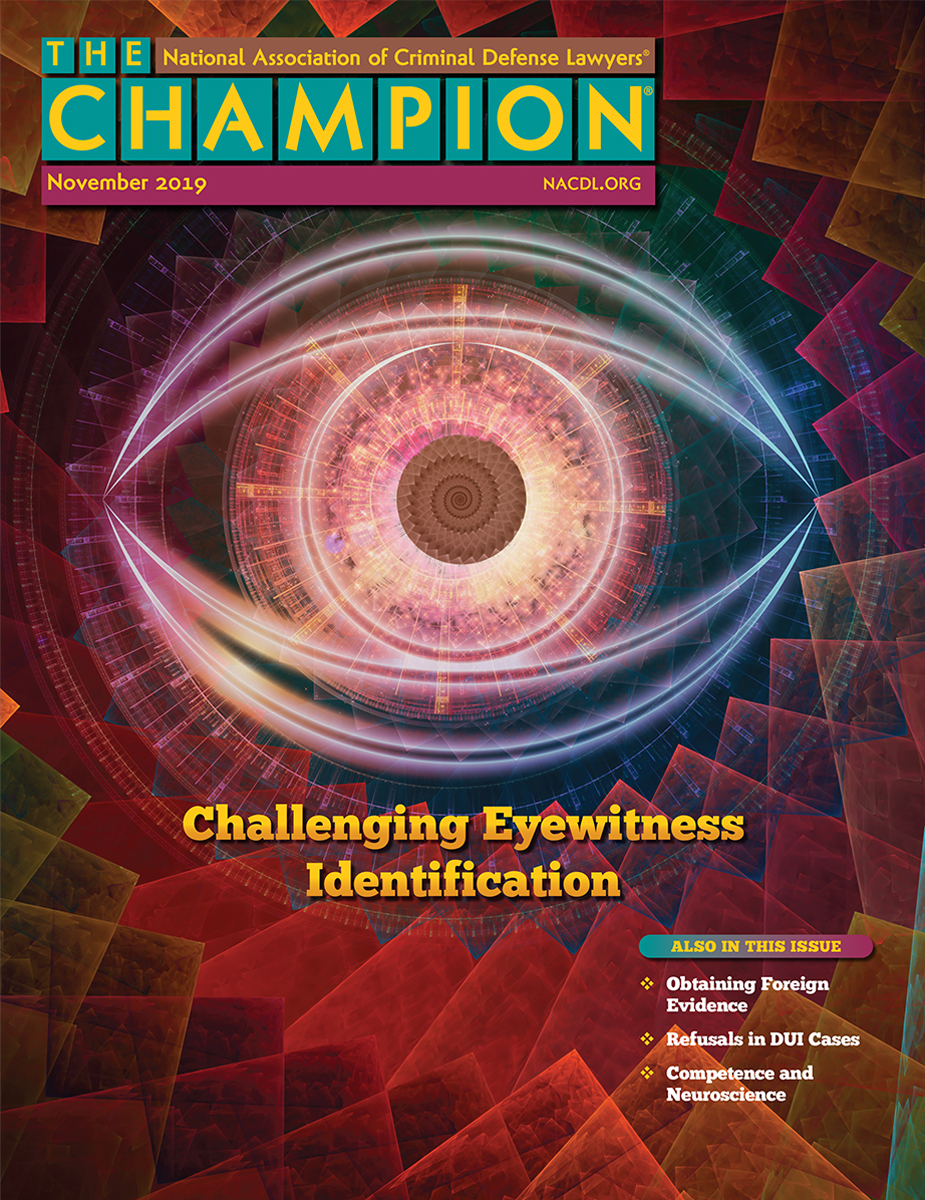November 2019

Defense attorneys must use creative strategies to seek suppression of tainted identification evidence and to force courts to consider current research into eyewitness fallibility.
Articles in this Issue
-
Affiliate News
What events are NACDL affiliates hosting this month? Find out here.
-
Book Review: Capital Defense by Jon Gould and Maya Pagni Barak
This month Robert Sanger reviews Capital Defense: Inside the Lives of America’s Death Penalty Lawyers by Jon B. Gould and Maya Pagni Barak.
-
Book Review: Infinite Hope by Anthony Graves
This month Susan Elizabeth Reese reviews Infinite Hope: How Wrongful Conviction, Solitary Confinement, and 12 Years on Death Row Failed to Kill My Soul by Anthony Graves.
-
Challenges to Obtaining Foreign Evidence in Cross-Border Criminal Cases
It is the criminal defendant who is at a disadvantage in a case involving foreign evidence. Among other things, the government has access to evidence through mutual legal assistance treaties and informal cooperation agreements. The authors provide an overview of constitutional issues defendants face when seeking foreign evidence in cross-border cases. They also discuss the methods defendants can use to obtain foreign evidence and the hurdles they may encounter when seeking it.
-
Confronting the Problems of Manson v. Brathwaite
Scientifically Sound Approaches to Suppression in Eyewitness Identification Cases
The Manson v. Brathwaite test for the admissibility of challenged eyewitness identification evidence is flawed. As a result, courts routinely allow the admission of tainted identification evidence. Decided in 1977, Manson is not in accord with subsequent scientific research into eyewitness fallibility. Defense attorneys must adopt creative strategies to seek suppression and force courts to consider both the science and Manson’s flaws.
-
Criminal Procedure: New FRCrP 16.1 Will Initiate Sea Change in Pretrial Disclosures
— If Judges, Prosecutors and Defense Bar Take It Seriously
Federal Rule of Criminal Procedure 16.1 was created because the Judicial Conference’s Advisory Committee on Criminal Rules realized that there was a problem with how and when Rule 16 material is produced. Defense lawyers are often overwhelmed by the production of terabytes of data.
-
From the President: ‘Reversal of Misfortune’
What is fueling the increase in rates of incarcerated women? How can society begin to reverse this growth?
-
Getting Scholarship Into Court Project
The “Getting Scholarship Into Court Project” brings helpful law review articles and other writings to the attention of criminal defense attorneys. The project’s purpose is to identify scholarship that will be especially useful to courts and practitioners. Summarized on this page are articles the project’s advisory board recommends that practicing lawyers take the time to read.
-
Lawyering Competence to Stand Trial with an Eye on Neuroscience
Defense lawyers addressing competence issues should gain familiarity with neuroscience-related literature. They should be able to consider neuroscience-related techniques that could provide explanations about the genuineness of an individual’s incompetence. At the very least, familiarity with neuroscience literature will inspire lawyers to ask experts about assessment approaches or inquiries that might be undertaken.
-
NACDL News: International Law Panel Discusses Trends and Challenges
NACDL News for November 2019.
-
NACDL News: NACDL Lauds Newly Introduced ‘Prohibiting Punishment of Acquitted Conduct Act of 2019’
NACDL News for November 2019
-
NACDL News: NACDL Voices Concerns About DOJ’s First Step Act Risk and Needs Assessment System
NACDL News for November 2019
-
Refusals in DUI Cases: How to Avoid the Stigma
Almost all DUI lawyers have agonized over how to handle the fact that a client refused to take a breath test following arrest. Starting in voir dire, the criminal defense attorney needs to help the jury understand reasonable doubt, burden of proof, and the fact that a defendant plays no role in submitting evidence at the time of arrest. Further, the defense attorney should touch upon these concepts during the opening statement, when cross-examining the arresting officer, and during the closing argument.
